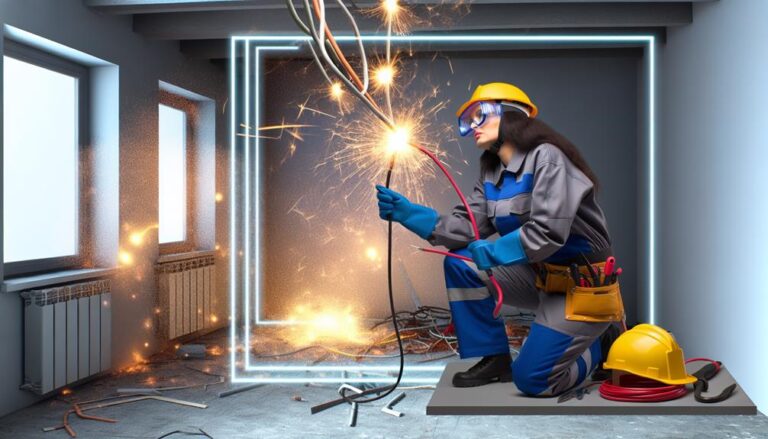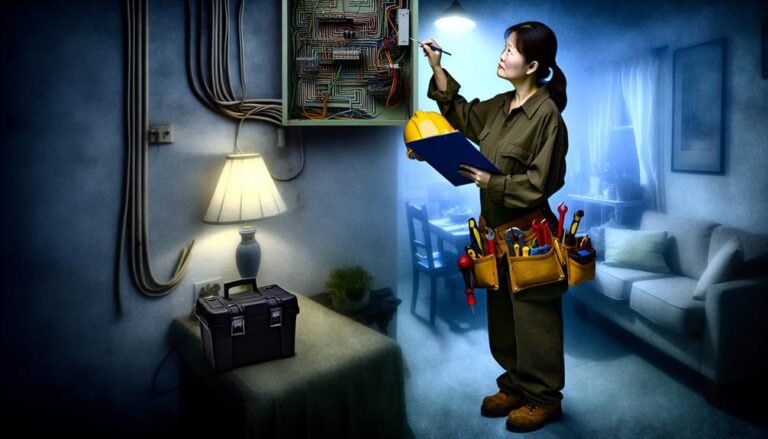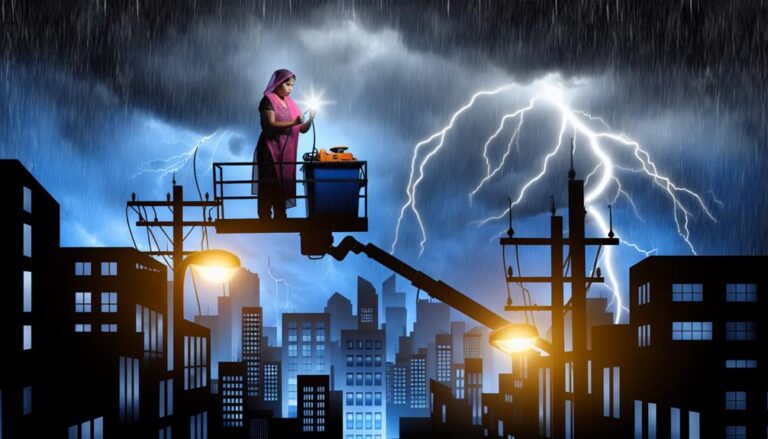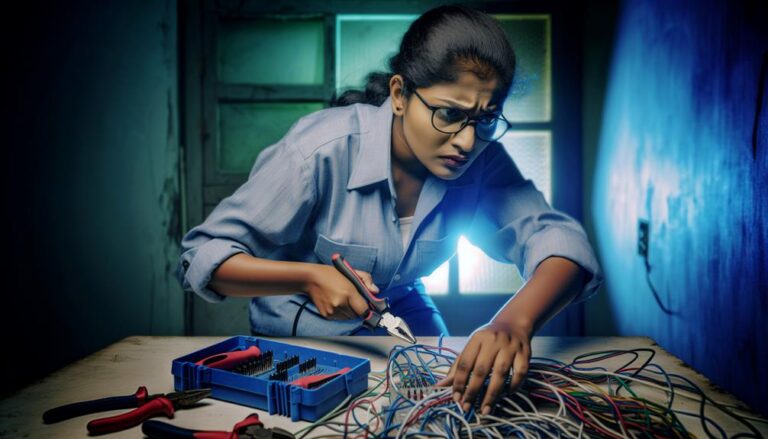How to Handle an Electrical Emergency: Tips From Professional Electricians
Picture this: you’re sitting in your living room, enjoying a quiet evening, when suddenly you hear a loud pop and all the lights go out. Panic sets in as you realize you’re facing an electrical emergency. But fear not, because professional electricians are here to share their tips on how to handle such situations.
From identifying the emergency to ensuring personal safety, shutting off the power supply, and contacting a professional, this discussion will equip you with the knowledge you need to navigate through the chaos and restore order.
So, what should you do when faced with an electrical emergency? Let’s find out.
Key Takeaways
- Identify visible signs of danger such as sparks, smoke, or flames and evacuate the area immediately.
- Cut off the power supply by locating the main circuit breaker or fuse box and turning off the corresponding switch or removing the fuse.
- Avoid touching electrical equipment or wires with bare hands and use insulated tools to minimize the risk of electric shock.
- Contact a licensed electrician or emergency services for professional help and keep their contact information easily accessible.
Identifying the Electrical Emergency
To properly handle an electrical emergency, you must first be able to accurately identify the nature and severity of the situation. When faced with an electrical emergency, it’s crucial to assess the potential risks and take immediate action to ensure your safety and the safety of those around you.
The first step in identifying an electrical emergency is to look for any visible signs of danger. This includes sparks, smoke, or flames coming from electrical outlets or appliances. If you notice any of these signs, it’s essential to quickly shut off the power supply to the affected area by locating the main circuit breaker or fuse box and turning off the corresponding switch or removing the fuse.
In addition to visible signs, you should also be aware of any unusual sounds or smells. Buzzing or crackling noises, as well as the smell of burning or melting plastic, can indicate a potential electrical emergency. If you detect any of these signs, it’s important to evacuate the area immediately and call emergency services.
Ensuring Personal Safety
Ensure your personal safety by following these essential steps during an electrical emergency:
- Stay calm and assess the situation: Take a moment to evaluate the severity of the emergency. Determine if it’s safe to remain in the area or if you need to evacuate immediately.
- Cut off the power supply: Locate the main electrical panel and turn off the circuit breaker or remove the fuse that corresponds to the affected area. This will help prevent further accidents or damage.
- Avoid contact with electrical sources: Don’t touch any electrical equipment, outlets, or wires with your bare hands. Even if the power is off, there may still be residual electrical energy that can cause harm.
- Use insulated tools: If you need to handle electrical equipment, make sure to use insulated tools to minimize the risk of electric shock. Avoid using any metal objects that conduct electricity.
- Call for professional help: Contact a licensed electrician or emergency services immediately. They have the expertise and equipment to handle the situation safely.
- Evacuate if necessary: If the electrical emergency poses an immediate threat to your safety, evacuate the area and call for help from a safe location.
Shutting Off the Power Supply
To safely shut off the power supply during an electrical emergency, locate the main electrical panel in your home or building. This panel is usually found in a basement, garage, or utility room. Once you have located the panel, follow the steps below to turn off the power:
| Step | Action | Image |
|---|---|---|
| 1 | Open the panel door using a screwdriver or key. |  |
| 2 | Identify the main circuit breaker. It is usually labeled as “Main” or “Main Breaker.” |  |
| 3 | Flip the main circuit breaker to the “Off” position. This will shut off power to the entire electrical system. |  |
Contacting a Professional Electrician
If you’re experiencing an electrical emergency, it’s essential to promptly contact a professional electrician. Trying to fix the problem yourself can be dangerous and may result in further damage or injury.
Here are some important steps to take when contacting a professional electrician:
- Research: Start by researching reputable electricians in your area. Look for those who are licensed, insured, and have good customer reviews. This will ensure that you hire a qualified and reliable professional.
- Emergency services: Check if the electrician offers emergency services. Electrical emergencies can happen at any time, day or night, so it’s crucial to find an electrician who can respond quickly to your situation.
- Contact information: Keep the contact information of the electrician handy. Save their phone number in your phone or write it down in a visible location, so you can access it easily during an emergency.
- Clear communication: When you contact the electrician, clearly explain the nature of your electrical emergency. Provide as much detail as possible, so they can understand the severity of the situation and come prepared.
- Follow their instructions: Listen carefully to the electrician’s instructions. They may ask you to turn off certain circuits or equipment to ensure safety. Follow their guidance until they arrive.
Preventing Future Electrical Emergencies
To prevent future electrical emergencies, it is important to regularly inspect and maintain your electrical system. By taking proactive measures, you can ensure the safety and functionality of your electrical system, minimizing the risk of emergencies. Here are some key steps to consider:
| Inspect Wiring Regularly | Practice Safe Electrical Usage | Install Surge Protectors |
|---|---|---|
| Regularly inspect the wiring in your home or workplace to identify any signs of wear, damage, or overheating. Address these issues promptly. | Avoid overloading electrical outlets and extension cords. Unplug appliances when not in use to prevent electrical fires. | Install surge protectors to safeguard your electronic devices from power surges and voltage fluctuations. |
| Use Proper Light Bulbs | Keep Electrical Appliances Away from Water | |
| Use the correct wattage of light bulbs for your fixtures to prevent overheating and potential electrical fires. | Keep electrical appliances away from water sources like sinks, bathtubs, and pools to prevent electrocution or short circuits. |
© 2025 By Electrician Phoenix






